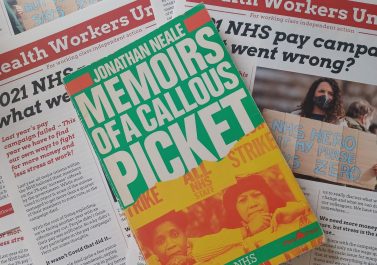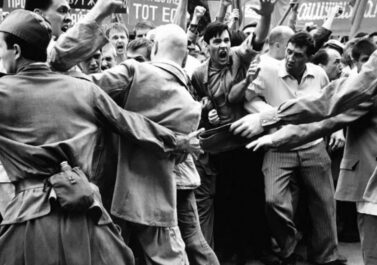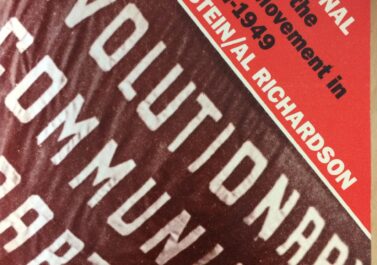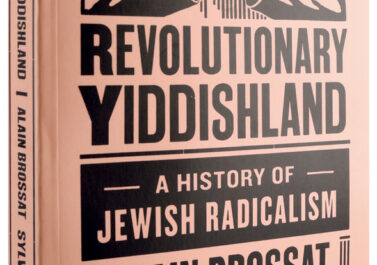Ammunition for the political autonomy of the working class
“AngryWorkers, a small political collective, have spent six years organising in London’s industrial backyard, mainly in the food manufacturing and logistics sector. This book is about their experiences as they try and find new ways of building class power in tough times. It is essential reading for anyone who is grappling with the question: ‘what next for working class politics and revolutionary strategy?’”
You can download the electronic version of the book here.
https://files.libcom.org/files/2023-03/Class_Power_on_Zero_Hours.pdf
If you can donate some dosh, it will all go back into our collective struggle!
——
Dear comrades,
If you are based in the UK or US you can order the book here – you can also find reviews and podcasts relating to our book:
Those of you who live in EU countries can now order our book ‘Class Power on Zero-Hours’ for 10 Euro plus 4,49 Euro postage. Outside of the EU postage might be slightly more.
If you order 5 or 10 copies both the book and postage will be cheaper.
Just send us an email:
angryworkersworld@gmail.com
If you want to read the introduction of the book:
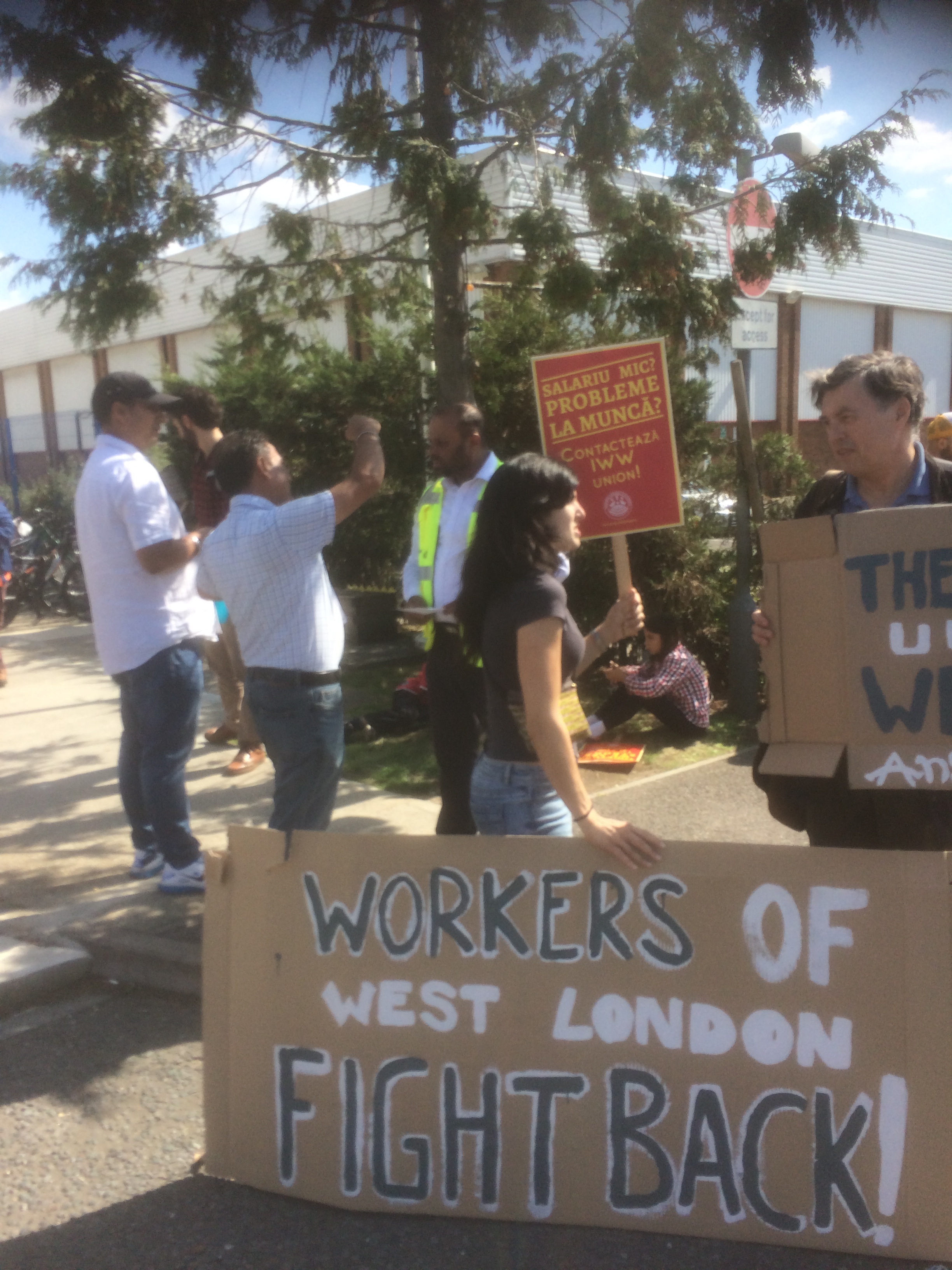
We will publish reviews and discussions relating to our book here. Feel free to leave comments below.
A German review of the recently published German edition:
A review from an anarchist view from down under:
https://www.redblacknotes.com/2021/11/21/class-power-on-zero-hours-an-anarchists-view/
A review written by a dear comrade from the AWL:
https://workersliberty.org/story/2021-01-18/class-power-zero-hours-review
Comments from an organic farm worker in Germany:
Comrades of the US group Insurgent Notes wrote five contributions to the discussion about ‘Class Power on Zero-Hours’.
http://insurgentnotes.com/2020/09/introduction-to-discussion-of-class-power-on-zero-hours/
We are grateful for their effort and wrote a response:
A new article about our project and book in the German magazine Express:
A short review in the Austrian magazine ‘Malmoe’:
https://www.malmoe.org/2020/06/26/linke-klassenpolitik-in-west-london/
A longer exchange between us and the CWO about the question of day-to-day struggles and class consciousness. Their review of our book is here: https://www.leftcom.org/en/articles/2020-08-12/class-power-on-zero-hours-learning-the-hard-way
We also received a review from the ‘Rebel Worker’ in Australia written from an orthodox ‘revolutionary syndicalist’ perspective. Unsurpriningly the author thinks that with ‘an experienced organiser’ some of the disputes we have been involved in could have been turned into successes. We think this believe in the ‘magic touch’ of organisers is misleading and factually incorrect. In the case of the Bakkavor dispute the main GMB guy was an ‘experienced’ industrial organiser who used to lead wildcat strikes in the construction industry in the 1980s – but all his experience didn’t help much when confronted with a migrant female workforce in a structurally weaker (food) industry during the time of the hostile environment of the Brexit era! The problem with syndicalism is that they have to ignore these ‘political’ issues of material limits to ‘organising’ – which paradoxically leads to weaker organised structures within the class.
A new review by a Plan C comrade. Some praise:
“Earlier this year, they released a book documenting their cumulative experiences and ideas, titled Class Power in Zero Hours; it is perhaps the most important book to have been published in recent decades for understanding and improving the political situation for the British working class today.”
And some critical remarks:
“Although many of their criticisms of modern political theory are well founded, I nonetheless feel that AWC are occasionally over-eager to rebuke recent developments in the field, such as in their sweeping claim that “Decades of neoliberalism has led to postmodern thinking within the left intelligentsia, which can only focus on difference: the patchwork of unwaged and unfree labour; the sphere of reproduction; the precarious professionals; the talk about ‘service’ or post-industrial society; privilege discourse.” Some of this critique certainly strikes at the heart of popular modern discourse about ‘social justice’, although it overlooks the revolutionary currents in so-called postmodern thinking associated with Fredric Jameson or David Harvey for instance. Additionally, their consignment here of “the sphere of reproduction” to the same theoretical periphery as “privilege discourse” and all other things ‘postmodern’ belittles the successes of contemporary feminist initiatives and movements, like the unionisation of sex workers and Women’s Strike.”
Just a quick response to that. We don’t consider the ‘sphere of reproduction’ itself as peripheral, a whole chapter of the book is dedicated to the question of working class family and (female) workers’ experiences beyond the workplace. What we find post-modern is the attempt to create a theoretical hype around ‘reproduction’, which results in disguising the dependencies on and potential strategical links with wider class struggle.
https://www.weareplanc.org/blog/class-power-on-zero-hours-book-review/
A comrade from the US wrote a very engaging, though not uncritical review.
“In the course of their struggles AngryWorkers have produced an immense body of writing for the purposes of agitation, debate, and to deepen their own understanding of the complex social world in which they are taking action. The best of it recalls Engels’s The Condition of the Working Class in England or the propaganda tracts by the enigmatic writer and illustrator known only as Prole. In contrast to the odd journalist or photographer who slums it for a short stint to document the lives of poor downtrodden workers, AngryWorkers are attentive not just to the obvious deprivation but to the potential power workers wield in daily cooperation and resistance.”
“As a textual whole, Class Power calls to mind the eccentric genius which strikes the first-time reader of Capital, and while lacking the lengthy mathematical interludes, Class Power compensates with extensive histories of supermarkets, food distribution, and West London itself, interspersed with hundreds of pages of workplace writing at once baroque and immanently practical.”
“Class Power on Zero-Hours is not without its shortcomings, but like all great works, its weaknesses are simply the underside of its strengths. For instance, in their practical analysis of the local working class, AngryWorkers return time and again to the abstraction of “the community,” meaning cross-class networks bounded by common language, nationality, and faith. They correctly argue that these communities are led by petty bourgeois “leaders” whose interests—expressed in exploitative employment, housing rental, citizenship schemes, for-profit language classes, and so forth—are opposed to the interests of their “community’s” working people. (…) Unfortunately, in formulating this practical analysis, AngryWorkers do not take seriously enough the powerful objective forces which give these community leaders their strength. When workers complain of racism in the factory, the group is quick to offer alternative explanations more directly tied to the shop’s division of labor. While AngryWorkers do not dispute the reality of racism and xenophobia, and document extensively the sick mischief such chauvinism causes among the working-class, they appear to not consider the color line itself a worthy basis of struggle. This is doubly frustrating as their own theory, expressed by their masterful critique of social democracy, decries placing the abstraction of formal “unity” ahead of unity produced by taking contradictions like the color line head-on.”
“Similarly, it is both a strength and a weakness of AngryWorkers that they attribute their failures thus far to a lack of capacity or unfortunate turns of events. Ultimately their scrupulously detailed critical reflections are less concerned with why things didn’t work and more occupied with how they could have gone differently. This is a sign at once of great optimism of the will, and also perhaps of a dose of stubbornness. To these critiques, I’m sure, the authors will reply: all of this is true, and that’s why you should join us to effect the shift from quantity to quality!”
https://brooklynrail.org/2020/06/field-notes/Class-Power-on-Zero-Hours
Then we have another beautiful piece of writing by a comrade around the Mute Magazine:
“It’s June 2020. It’s the beginning of a new volume in our history. The last one was called The Long Revolution, the new one’s called The Long Funeral. This weekend I saw an expression of it in the actions of thousands of people who took the knee to scream out the name of Belly Mujinga on a wet road in Parliament Square, and in 2017 AngryWorkers saw it in the responses of Greenford Tesco CFC workers to the Grenfell disaster too – ‘the only … moment’ against a background of sullen depoliticisation ‘when a single event forced most people to say something’. There’s no need to romanticise all this. Every one of the killings and catastrophes that defines the new moment really is a kind of anti-revolution, an intense concentrated expression of the loss of working class power just as a revolution is an intense concentrated expression of the recovery of it. Our broad tradition on the left used to say there’s power in a union. It now has to understand there’s power in a funeral too, and that talk about ‘communism’, ‘revolutions’, ‘parties’, ‘democratic socialism’, ‘communisation’, ‘insurrection’, ‘capitalism’ etc. is idle unless we can recognise this reality for what it is – which is exactly what Class Power on Zero-Hours does, as it sets out its case for the one concept on ‘the left’ that can fill all of its other languages, histories, struggles and debates with new meaning. The clue’s in the title.”
“For me, though, the best thing about Class Power on Zero-Hours is that its ABCs never get in the way of its account of the situation on the ground. For AngryWorkers, ‘getting rooted’ in the working class means encountering people as they actually are, and not as someone on the internet thinks that they ought to be.”
“Along with D. Hunter’s Chav Solidarity and Phil A. Neel’s Hinterland, it’s probably the best book about class to come out of the tiny circles of English-speaking anarchists and communists in the last ten years, and everyone who cares about that stuff even a little bit should definitely read it.”
https://www.metamute.org/editorial/articles/three-class-struggles-and-funeral
Then we got a proper bashing by US union organizers
“The Angry Workers’ organizing is littered with these kinds of strategic mistakes. Taking action without a demand attached, gathering signatures for a petition and not delivering it, delivering demands with no plan to escalate, talking to people on the job instead of outside of work, holding “boozy” meetings where nothing gets decided, taking haphazard action that exposes themselves and their coworkers to retaliation.”
We think the review sets us up as a bit of a straw man, probably in the struggle within the US IWW between ‘proper unionists’ and ‘movement people’. In the book we are very honest about all the various forms of organising we undertook, but the honesty wasn’t really appreciated. The many examples of ‘traditional organising’ (we organised family outings, cricket matches, represented dozens of workers in disciplinaries, organised meetings between female line workers and participants in important women strikes in the 70s, organised cleaners combine meetings across four factories, mobilised for collective bargaining rights by speaking to 1,000 warehouse colleagues individually etc.) are largely omitted in order to prove that as ‘external infiltrators’ we had to fail. Again, we could have written the book differently and boosted the many small successes that we had, but we thought that this has been done enough and what both the communist milieu and working class militants need is an honest reflection. We will write a reply – not in self-defence – but the discussion is politically important.
https://organizing.work/2020/06/better-luck-next-time/
We wrote a detailed and hopefully not too self-defensive response:
We are grateful for the first review, written by ‘Lipstick Socialist’, who herself knows and writes about the world from a working class women’s perspective:
“What makes this a really important book is the day by day reporting of how the AW went about their political activity – not just in the workplaces, but in getting involved with solidarity networks and local campaigns. It is heartening to read about the cases they took up from supporting an area street sweeper to getting the overtime payment owing to a Polish family who had problems with their landlord. Alongside the text there are some great photos of the AW taking direct action by protesting outside an employer’s premises who owed outstanding pay.
Throughout the book there is a continuous analysis of their own activity, and particularly the challenges of working in an environment where workers on different contracts are pitted against each other and mutual trust is hard to come by in this harsh work life. Trade unions do organise in the food sector and they should be on the side of the workers – particularly the most vulnerable and poorly paid – but the description of USDAW’s behaviour towards its workers at Tesco and its partnership deal with the management shows how many mainstream unions have contributed to their own decline.”
https://lipsticksocialist.wordpress.com/2020/04/08/my-review-of-class-power-on-zero-hours/
The author of the next review asks the important question of who we are writing for:
“My inner debate about the book kept focussing on: is it a way forward for the working class, or is it a guide for “activists”? But, while many people will write their programmes for “the working class” that are read by virtually no-one, I think the Angry Workers are right to see that it is exactly these new, mostly young, people who are coming into the debate that are the possible transmission of thought/action into the wider movement. Their insistence on directing attention to the revolutionary potential of the working class, and to what that revolution really is, is spot on.”
And whether our focus on ‘strategic sectors’ makes sense:
“Unlike many groups, the Angry Workers are not fascinated by “politics”, are not dancing like a moth near a candle around either the parliamentary charade, or the supposedly more revolutionary politics of the left. They continually go back to the social revolution, that is, the revolution in the way human society organises its activity of creating everything it needs, not just the political revolution of changing people at the top which always leaves the fundamentals unchanged. There are things I want more discussion on. Are the Angry Workers’ concrete proposals a bit too schematic? Is the elevation of strikes in strategic industries really how the world is going to move towards revolution?”
The review published in Freedom Press emphasises the significance of ‘workers’ inquiry’
“As befitting a book so heavily focused on the workplace, the strategies that come in for the most in-depth examinations are union ones. Rather than adopting a dogmatic position based on some dead theorist or another, their criticisms of TUC trade unions like the GMB or USDAW are based on extensive experience with taking up rep positions and trying to see how far those bodies can be used to increase workers’ confidence and militancy – and, importantly, seeing the very real limitations of those organisations up close.”
“This point brings me on to another of the book’s great strengths, the way that they use a class composition/workers’ inquiry approach to examine the divisions and hierarchies that exist within the working class. The book is certainly not intended primarily as a contribution to the ongoing “class vs idpol” wars, but in its close attention to the complexity of the actual composition of the working class at a specific moment in time, it serves as a damning critique of both poles of the debate.”
“But in closing, I want to recommend this book with an unlikely compliment: while sat around my house reading it in quarantine, I found some part of myself itching to get back to the workplace, grabbing brief chats with colleagues in the kitchen and complaining about the job or the latest bullshit from management. No small achievement.”
https://freedomnews.org.uk/what-a-way-to-make-a-living-class-power-on-zero-hours/
The writer of this review liked the work reports in our book, but is rather defensive about the cultural achievements of the west-London working class:
“The assertion that Greenford has cultural desert status appears obnoxious, racist and anti-working class: clearly not positions Angry Workers would want to be associated with even if what’s quoted above might be (mis)read as linking them to views of this type. Bourgeois distaste for proletarian culture – sometimes expressed with the absurd assertion that the working class don’t have a culture and exists in a ‘cultural desert’ – can be found among parts of what Angry Workers seem to be describing as the London ‘left’.”
We really appreciate having a couple of cans of lager in Perivale Park or a shish-kebab from Lahori Bites on Greenford road – and we had plenty of them! But come on, all cinemas closed in Southall and Greenford, no live-music apart from some mediocre Oasis-cover songs in the Wishing Well or some ganas to Guru Nanak or Krishna in the local temple, 8 quid to see a shit game by Greenford FC… they fucking starve us out here!

